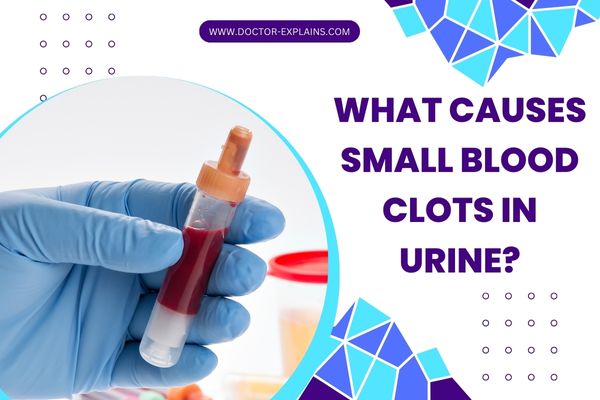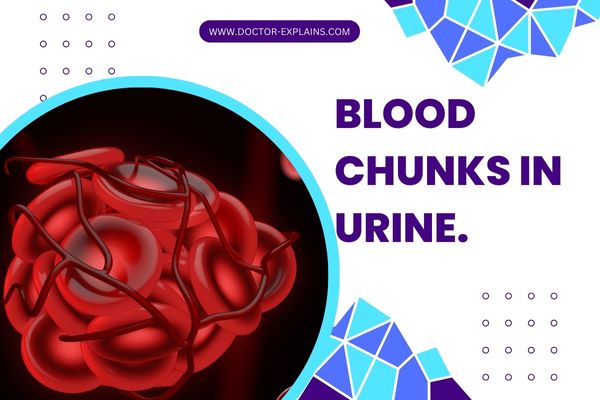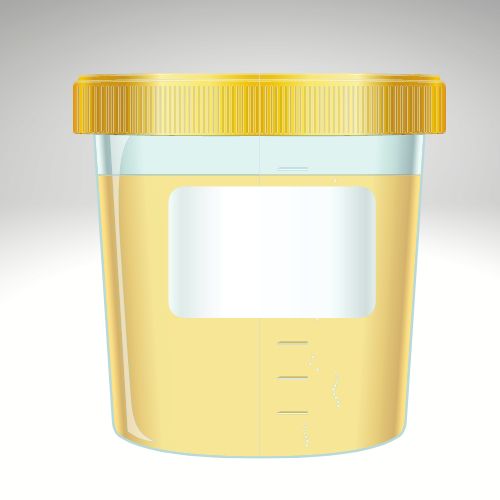Blood Clots When I Pee (No Period): Causes & When to worry
Our content is not intended nor recommended as a substitute for medical advice by your doctor. Use for informational purposes only.
Key Facts:
- Blood clots in urine can be caused by urinary tract issues or vaginal bleeding, even if it’s not during a period.
- Symptoms of urinary tract bleeding include painful urination, frequent urges to pee, and difficulty passing urine.
- Causes of urinary tract bleeding can include kidney stones, UTIs, and bladder cancer.
- Causes of vaginal bleeding leading to blood clots when you pee include irregular periods, infections, and growths (benign and malignant tumors).
- See a doctor if you experience red flag signs such as difficulty passing urine, worsening pain, or fever.
[1] The two main sources of blood clots when you pee.
Blood clots in the toilet can be confusing for women. The two main sources of blood clots are:
- Vaginal bleeding (Mainly from the uterus): It can mimic blood clots in urine.
- Urinary tract (the kidneys, bladder, ureters, urethra, or the prostate).
Vaginal bleeding can cause blood clots to appear in urine (in the toilet water) when you pee, which makes it look like there are blood clots in urine.
However, this is not real hematuria; it’s called false hematuria. Blood clots from the urinary tract (true hematuria) appear with urine and are often accompanied by other urinary symptoms.
Even if you are not having your period, blood clots can still be from vaginal bleeding. In addition, many women experience irregular periods, spotting, and other conditions that may lead to blood clots from the genital tract that may be mistaken as blood clots in urine.
The differences and causes of both blood clots in urine and false clots (of vaginal origin) are explained in the next sections.
[2] How to tell the difference between hematuria and vaginal bleeding.
Sometimes, it is difficult to differentiate between blood clots in urine and those communing from the uterus (vaginal bleeding), especially if there is no period.
Both can appear as small blood clots in urine (typically seen in the toilet). Vaginal bleeding may occur without a period making the source of bleeding more confusing.
The following table can help you differentiate between hematuria (real blood and blood clots in urine) and blood clots in urine due to vaginal bleeding.
| Symptom | Clots due to urinary tract bleeding | Clots due to vaginal bleeding |
|---|---|---|
| Bloody vaginal secretion (without urination) | Not present | Typically present. |
| Painful urination | Yes | No |
| Frequent urge to pee | Yes | No |
| Sudden Urge to pee | Yes | No |
| Difficulty passing urine | May be present | Absent |
| Pain site (if present) | lower abdominal (similar to period pain) | Lower abdominal (bladder pain), flank, back, or groin pain. |
| Relevant History | Recent UTI, urinary tract stone, etc. | Irregular menses, sexual intercourse, etc. |
[3] Causes & Symptoms of Blood clots in urine
[A] Urinary tract or kidney stones.
Stones in the kidney or urinary tract cause injury to the lining tissues of the urinary tract and may cause bleeding and blood clots in urine (especially when it moves through the urinary tract.
Common symptoms of kidney stones:
- Kidney stones cause loin pain (in the flanks and upper back).
- Ureteric stones cause severe flank and groin pain (comes and goes in attacks) on one side of the abdomen.
- Urinary bladder stones cause lower abdominal pain (bladder pain) and frequent urination.
- All types of stones may cause hematuria (red urine) with or without blood clots in your pee (small or large).
- Turbid urine.
- Severe nausea or vomiting during the attack of loin pain.
- Difficulty passing urine (due to urinary obstruction by the stone or a blood clot).
[B] UTI (urinary tract infection).
Urinary tract infection is very common among females in their child-bearing period. If you are a female and getting small blood clots when you pee (but no period), always consider a urinary tract infection.
UTI is more likely to be the cause of small blood clots in urine if your symptoms and signs of the condition, such as:
- Painful urination.
- Sudden urge to pee.
- Frequent peeing of a small amount of urine.
- The urine may become unclear (turbid, bloody, or containing small blood clots).
- Bladder pain (in the lower abdomen).
[C] trauma or strenuous sports.
Direct or indirect trauma or stress can cause bleeding from the urinary bladder or urethra and blood clots in urine.
This can lead to reddish urine (hematuria) with or without small blood clots when you pee (although you are not menstruating).
Common examples include:
- Long-distance running (Runner’s Bladder).
- Pelvic trauma due to some strenuous sports (prolonged bicycling or horseriding).
- Recent insertion of a urinary catheter.
- Sexual play in the urethra (males or females).
- Pelvic trauma (typically blunt trauma).
- Medical procedures involve introducing devices into the urinary system, such as cystoscopy and ureteroscopy.
- Taking a kidney biopsy.
The small blood clots in your pee typically follow a known event that leads to bleeding even if you don’t have a period.
[D] Urinary bladder cancer.
Bladder cancer is a relatively common tumor (however, it is not common in young females). Men over 50 years old and smokers are at much higher risk.
Urinary bladder cancer typically causes recurrent red urine or blood clots in urine with no pain.
[E] Other causes of small blood clots in urine in women.
- Benign kidney tumors.
- Adult polycystic kidney disease.
- Pyelonephritis (complicated UTI).
- Hydronephrosis.
- Arteriovenous malformations.
- Sickle cell disease (papillary necrosis of the kidney).
- Ureteric stricture.
- Ureteric polyp.
- Urinary bladder radiation.
- Urethral diverticulum.
- Urinary tract endometriosis.
- Tuberculosis of the urinary tract.
[4] Causes of blood clots due to vaginal bleeding (during no period).
As we explain above, blood clots when you be is not always of a urinary source, and they can be of a vaginal source even if it is not the time of your period.
Possible causes of vaginal bleeds leading to blood clots are:
[A] Dysmenorrhea (irregular menses).
Experiencing tiny clots when you pee may be a sign of an unexpected period. If you are unsure if it is menstrual blood, check the source of clots carefully (vaginal or urinary).
Common causes of irregular menses include (reference):
- First few months of menses (menarche) in teen and preteen girls.
- Last few months or years of menses (perimenopausal period).
- Stress.
- Eating disorders.
- Intense exercise.
- Lactation.
- Polycystic ovary syndrome.
- Thyroid gland dysfunction.
- Chronic debilitating diseases such as liver and kidney diseases.
[B] Drugs
many medications may cause hormonal disturbances or bleeding, leading to the passage of blood clots from the uterus. Commonly:
- Oral Contraceptive pills.
- Other forms of hormonal contraceptives such as Skin patches, injections, etc.
- Blood-thinning medications (anticoagulants).
- Tamoxifen
- Chemotherapy
- Phenytoin.
- Antipsychotic medications.
- Severe allergy to antibiotics.
[C] Infection
- Endometritis (inflammation of the uterine lining).
- Cervicitis (inflammation of the cervix).
- STDs (sexually transmitted diseases).
- Vaginitis.
- Bacterial vaginosis
[D] benign growths
- Fibroids.
- Cervical polyp.
- Endometrial polyp.
- Vaginal Gartner’s duct cysts, vulval cysts, etc.
[E] Cancers.
- Uterine cancer
- Vaginal cancer.
- Cervical cancer.
- Vulvar cancer.
- Ovarian or fallopian tube cancer (rare).
[F] Others.
- IUD (Intrauterine device).
- Sexual intercourse.
- PID (pelvic inflammatory disease).
- Endometriosis
- Systemic diseases include bleeding disorders, renal diseases, thyroid diseases, etc.
[4] When to worry.
The first step is to double-check the source of small blood clots that appear when you be (whether it is of urinary or vagianl origin).
Always consult your doctor, especially if you are not about the cause.
In most cases, small blood clots are typically due to UTI, urinary tract stones, or simple vaginal bleeds due to spots, stress, or hormonal fluctuation.
Red flag signs of blood clots include:
- Blood clots with darkening hematuria that doesn’t improve for days.
- Blood clots cause difficulty passing urine (blood clots can block urine passage and cause retention).
- Development of urine retention (clots obstructing the urine stream).
- Worsening pain (renal colic or bladder pain).
- Fever.
- Pallor, shortening of breath, fast heartbeats, or fainting attacks.
- Recurrent blood clots with weight loss in patients with risk factors for bladder cancer.
- Massive vaginal bleeding.
- Evidence-based
- Written by a doctor.
MD, Internal Medicine and Nephrology specialist.

Dr. Esraa A. MagidAuthor
MORE INSIGHTS





